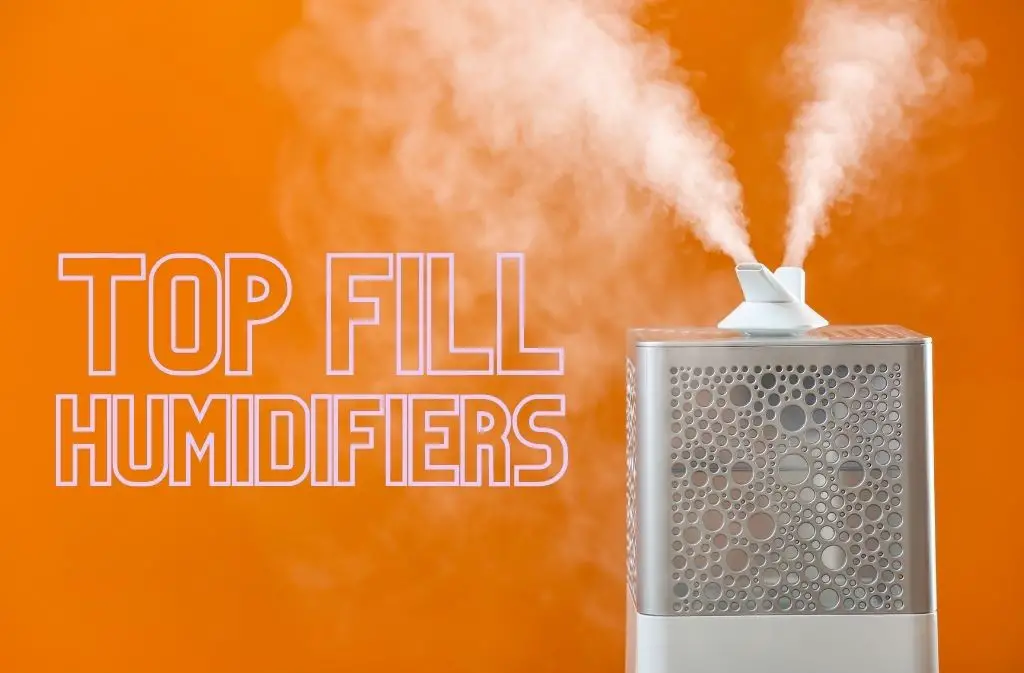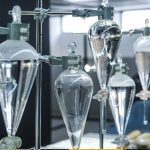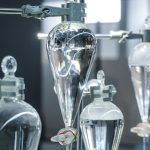No — you should not use tap water in your CPAP machine. Tap water contains minerals, bacteria, and other impurities that can damage the device, leave behind harmful buildup, and even cause respiratory problems. Always use distilled water to keep your CPAP safe and effective.
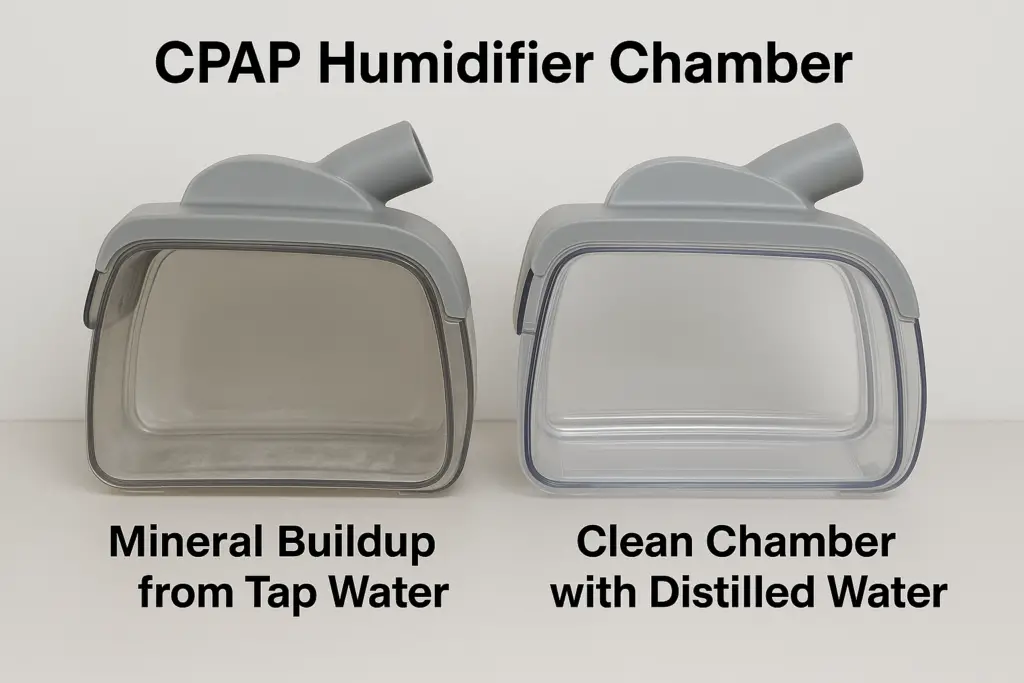 Why You Shouldn’t Use Tap Water in a CPAP
Why You Shouldn’t Use Tap Water in a CPAP
When you set up a CPAP machine at night, it feels natural to just fill the reservoir with whatever water is on hand. But here’s the problem: tap water isn’t pure. It contains minerals like calcium and magnesium, trace metals, and sometimes even chlorine or bacteria. Over time, those tiny impurities can turn into big problems for both your machine and your health.
Organizations like the Sleep Foundation and the American Academy of Sleep Medicine both stress that distilled water is the only safe, long-term choice for CPAP humidifiers.
A Real-World Example: What Happened When My Wife Used Tap Water
My wife got her CPAP through a sleep study, so it wasn’t as simple as running to the store for a replacement when it stopped working. When the machine quit, she had to send it off for repair. They gave her a loaner in the meantime, but even that took a mix-up and extra waiting to sort out. In the end, she went weeks without her own machine, struggling through the hassle of back-and-forth replacements.
Finally, the repair center let us know what had happened: the problem wasn’t a bad motor or faulty electronics — it was the water. The tap water she had been using had left behind so much mineral buildup that it clogged and damaged the system. All of that frustration, time lost, and inconvenience came down to one simple mistake: not using distilled water.
 What Happens If You Use Tap Water?
What Happens If You Use Tap Water?
- Mineral Buildup: Hard water leaves white, chalky deposits inside the water chamber. Over time, these scale deposits can damage heating elements and block airflow.
- Bacterial Growth: Tap water is not sterile. Bacteria and mold can grow in the humidifier chamber, then travel into the mask and tubing — straight into your lungs.
- Bad Smells: Machines can start to smell musty or stale, making it harder to sleep comfortably.
- Warranty Issues: Manufacturers often state clearly that using anything other than distilled water may void your warranty. The FDA lists distilled water as the standard for safe use in medical devices like CPAPs, BiPAPs, and APAPs.
Repair shops see this all the time — it’s one of the top reasons CPAP machines fail early.
 Water Types Compared for CPAP Use
Water Types Compared for CPAP Use
Not all water is created equal. Here’s how different types stack up for CPAP safety:
| Water Type | Safe for CPAP? | Notes |
|---|---|---|
| Distilled Water | ✅ Best choice | Removes minerals & bacteria; manufacturer-recommended. |
| Tap Water | ❌ No | Mineral deposits, bacteria, mold, and warranty issues. |
| Bottled/Spring Water | ⚠️ Short-term only | Often contains minerals; may cause buildup. |
| Boiled Tap Water | ⚠️ Short-term only | Kills bacteria but minerals remain; still causes scaling. |
| Filtered Water | ⚠️ Not recommended | Reduces some impurities but doesn’t remove minerals completely. |
The Cost of Repairs vs. Distilled Water
A gallon of distilled water usually costs between $1 and $2 at most grocery stores. A CPAP repair, on the other hand, can run anywhere from $100 to $300 or more depending on the issue. And if your machine was supplied through a sleep study, the process of getting it fixed can drag out for weeks — leaving you dependent on a loaner machine or, worse, without one at all. That makes distilled water one of the cheapest and smartest forms of protection you can buy.
Why Protecting Your CPAP Matters
CPAP, BiPAP, and APAP machines aren’t just gadgets — they’re life-changing medical devices that keep sleep apnea under control. Going without one for even a few nights can mean poor sleep, daytime fatigue, higher blood pressure, and added strain on the heart. Protecting your machine with distilled water isn’t just about saving money on repairs — it’s about protecting your health every single night.
Quick Checklist: Caring for Your CPAP Humidifier
- ✔️ Always use distilled water
- ✔️ Empty the chamber daily
- ✔️ Wash with mild soap weekly
- ✔️ Replace the water chamber as recommended
- ✔️ Inspect tubing and mask regularly for buildup
Following this routine will prevent most problems CPAP users run into — from funky smells to clogged machines.
Health Risks of Using the Wrong Water
It’s not just about protecting the device. Using tap water or letting bacteria grow in your CPAP humidifier can lead to respiratory irritation, sinus infections, and even more serious conditions like pneumonia. The American Lung Association warns that contaminated air sources can worsen chronic respiratory conditions, especially in people already dealing with sleep apnea. For anyone with a compromised immune system, the risks are even higher.
What If You Don’t Have Distilled Water?
Sometimes you might run out of distilled water at night. If you’re in a pinch:
- Boiled Water: Boil tap water for at least 5 minutes, then let it cool. This removes bacteria but not minerals — so use sparingly.
- Bottled Water: Safer than tap, but still not ideal because it often contains minerals.
- Filtered Water: Removes some impurities but still doesn’t equal distilled.
These are temporary solutions only. As soon as possible, switch back to distilled water to avoid long-term problems.
 Travel Tips for CPAP Users
Travel Tips for CPAP Users
If you travel often, it can be tricky to always find distilled water on the road. Here are some ways to stay prepared:
- ✈️ Pack small bottles of distilled water in your luggage for short trips.
- 🛒 Order travel-size CPAP water packs online for convenience.
- 🏠 Invest in a home countertop water distiller if distilled water is hard to find in your area.
- 📦 Use an Amazon Subscribe & Save option to always have a steady supply delivered to your door.
With a little preparation, you can avoid the temptation to use tap water while away from home.
Lesson Learned: Distilled Water Is Cheap Protection
If you take nothing else away from this article, remember this: distilled water is not just a suggestion — it’s the lifeline of your CPAP machine. My wife’s experience showed how quickly things can snowball: weeks without her own machine, hassle with a loaner, and the frustration of learning that it all came down to tap water. Don’t risk damaging your machine, voiding your warranty, or breathing in harmful bacteria. A $1 jug of distilled water keeps your therapy safe, your machine running longer, and your nights worry-free.
CPAP Water FAQs
Here are some of the most common questions people have about CPAP water use:
What happens if I accidentally used tap water one night?
Don’t panic — one night won’t usually cause major damage. Just empty the chamber in the morning, rinse it well, and switch back to distilled water. Problems come from repeated use of tap water, which leads to buildup and bacterial growth.
Can I use bottled water in my CPAP?
Bottled water is cleaner than tap but often contains minerals, so it’s not a safe long-term replacement. If you’re traveling and can’t find distilled water, bottled can work for a night or two until you get the right water.
Can I boil tap water to make it safe for my CPAP?
Boiling kills bacteria, but it does not remove minerals. So while boiled water is safer than raw tap water in an emergency, it still risks leaving deposits inside your CPAP over time. Use only as a short-term solution.
How often should I clean my CPAP water chamber?
Most manufacturers recommend rinsing it daily and giving it a thorough wash with mild soap once a week. Regular cleaning prevents buildup and bacteria, even when you’re using distilled water.
What happens if I keep using tap water anyway?
Over time, you’ll likely face mineral scale buildup, musty smells, and possibly mold. Worst case, the machine can fail — just like my wife’s did — leaving you without therapy until it’s repaired or replaced.

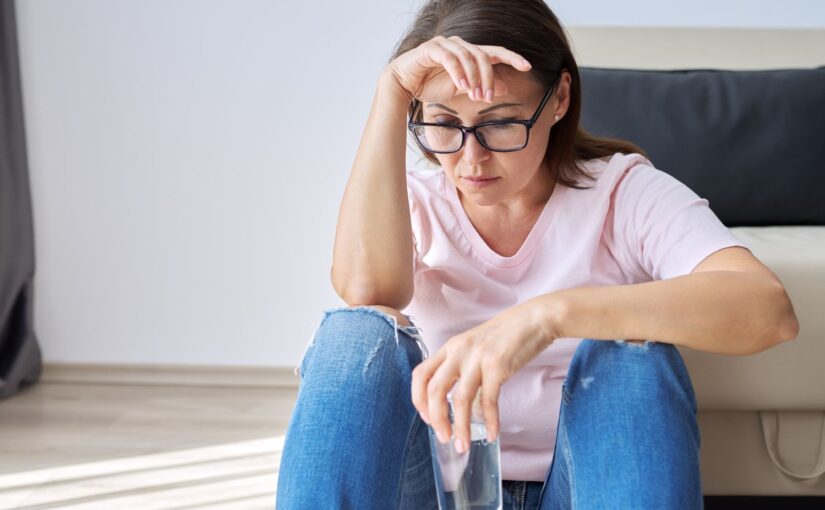
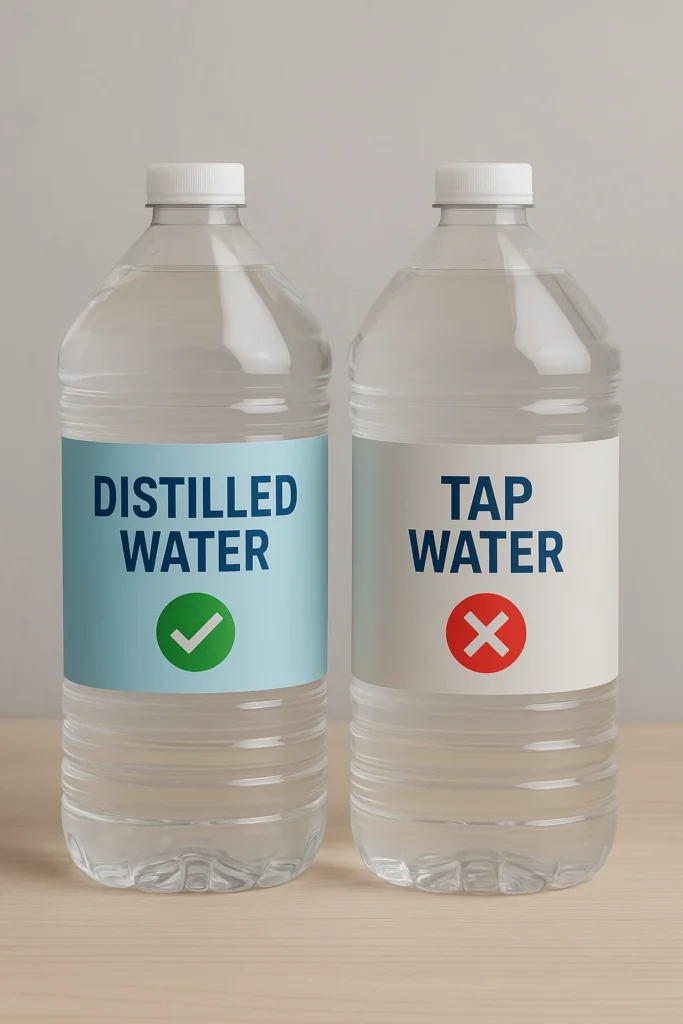 What Happens If You Use Tap Water?
What Happens If You Use Tap Water?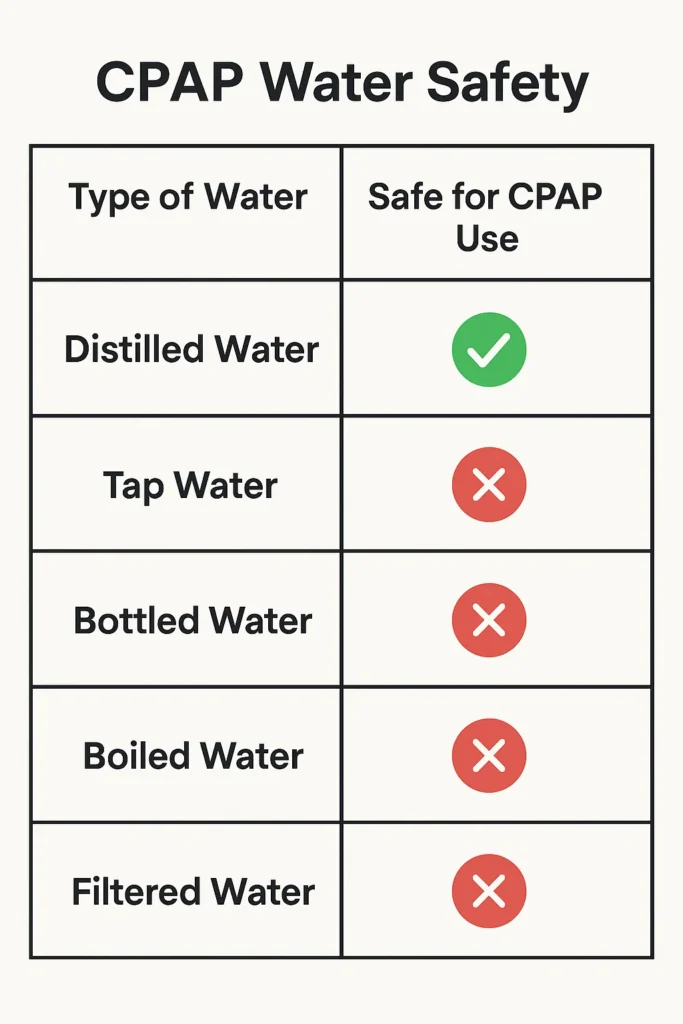 Water Types Compared for CPAP Use
Water Types Compared for CPAP Use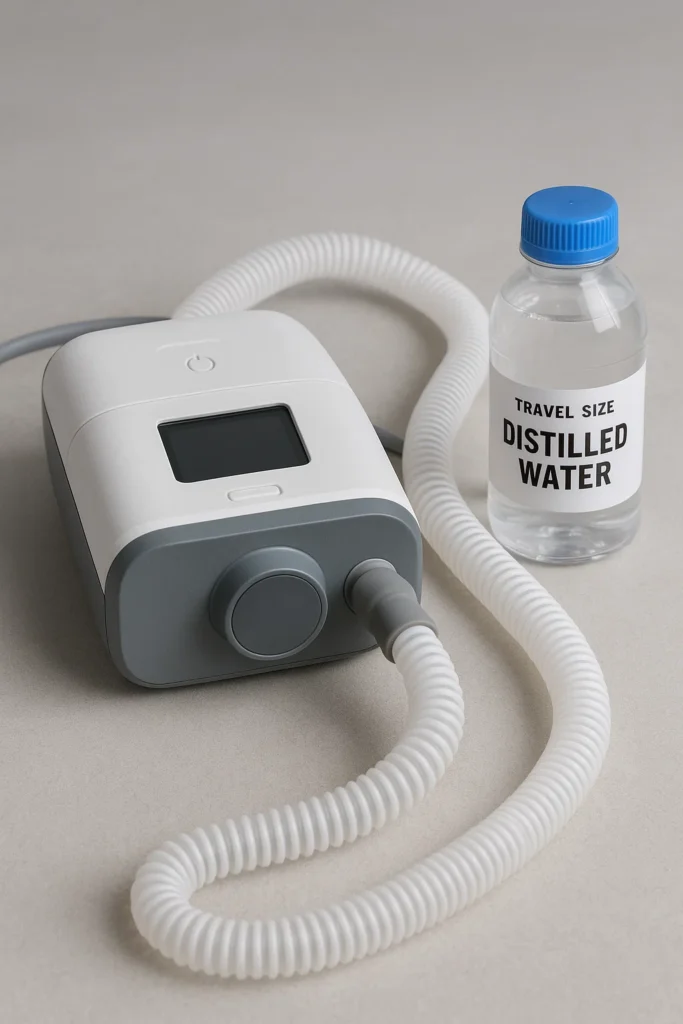 Travel Tips for CPAP Users
Travel Tips for CPAP Users